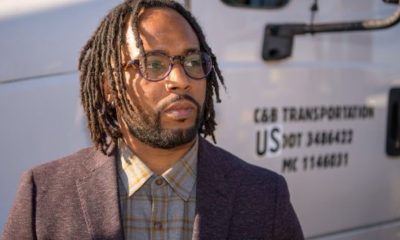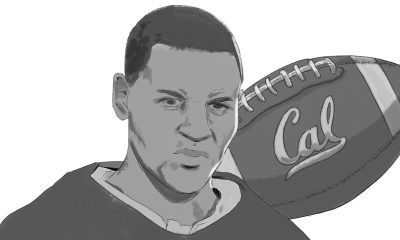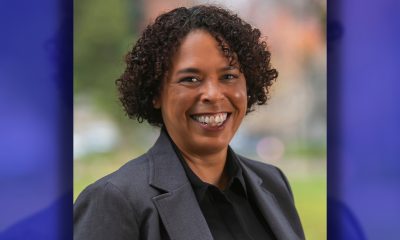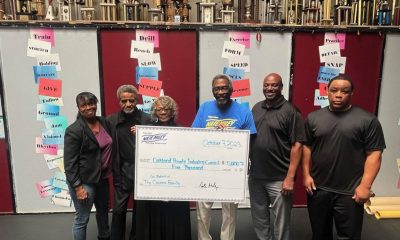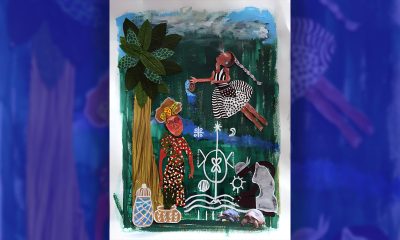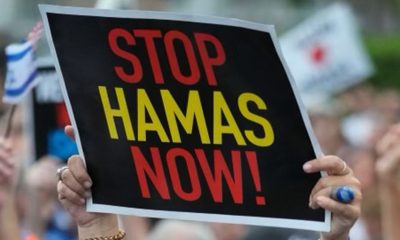Bay Area
COVID-19’s Unequal Toll on Black Americans: A Q&A With Tina Sacks
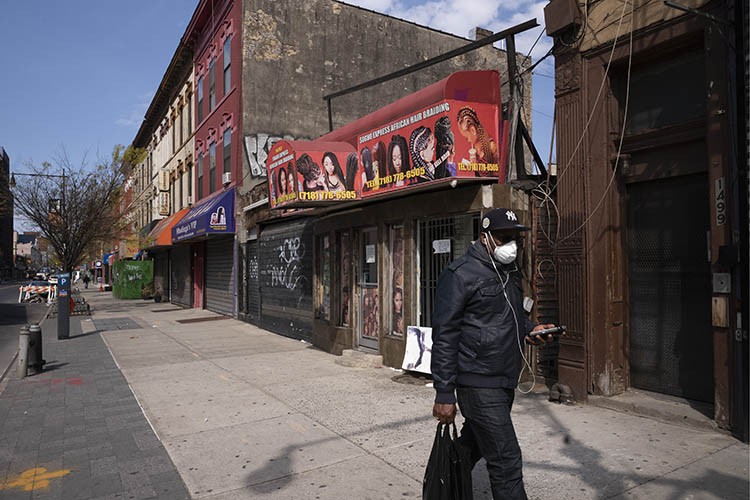
The recently-released data are shocking: COVID-19 is infecting and killing black people at an alarmingly high rate. An Associated Press analysis — one of the first attempts to examine the racial disparities of COVID-19 cases and deaths nationwide — has found that, of nearly 3,300 of the 13,000 deaths so far, about 42% of the deceased were African American. Black Americans account for about 21% of the total population in the areas covered by the AP analysis.
Other minority groups’ cases and deaths are fairly in line with their demographics, the analysis found, although among Hispanic individuals, there are some hot spots.
Black residents have been hardest hit in several U.S. cities, including New York City, Milwaukee and New Orleans. In another, Chicago, the city’s public health agency reported this week that African Americans accounted for 72% of deaths from COVID-19 complications and 52% of positive tests for the coronavirus, despite making up only 30% of the city’s population.
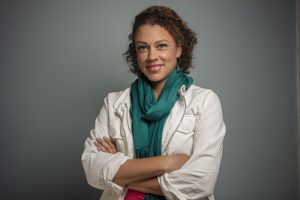
Tina Sacks
This week, Berkeley News spoke about this issue with Tina Sacks, an assistant professor in the School of Social Welfare and faculty chair of the Center for Research on Social Change at the campus’s Institute for the Study of Societal Issues. Her areas of expertise include racial disparities in health and health care; race, class and gender; and the social safety net.
Before her arrival at Berkeley, she worked for the Centers for Disease Control and Prevention for nearly 10 years as special assistant to the CDC director during the first coronavirus outbreak — SARS (severe acute respiratory syndrome).
Berkeley News: Data are beginning to surface that black Americans are suffering the brunt of the health and economic impacts of the coronavirus pandemic, especially in urban areas. What structural factors in our society are contributing to these alarming outcomes?
Tina Sacks: Unfortunately, the preliminary data that we are seeing is in keeping with what we might expect, given the underlying structural inequality in this country. First, black people have experienced decades of residential racial segregation, unlike any other ethno-racial group. This means that Black neighborhoods typically have fewer institutional anchors, such as grocery stores, good schools and safe places to walk outside and exercise. There is even a relationship, for example, between residential segregation and living in neighborhoods with fewer trees, which leads to poorer air quality.
Black people are disproportionately exposed to indoor and outdoor environmental toxins in their homes and neighborhoods. Black people are more likely to grow up in poverty, live in substandard housing, attend under-resourced schools and are more likely to end up in the carceral system. All of these things exact a terrible toll on black people’s health through the life course, making them more likely to have the chronic conditions — like diabetes, asthma and hypertension — that make them more vulnerable to COVID.
Black people are also more likely to be uninsured, making their access to care spotty. Plus, we know from my work and that of others scholars who research bias during the health care encounter that Black people’s health complaints are less likely to be taken seriously.
So, if someone does present in the emergency room, they may be turned away. Black people face challenges when they need to interface with the health care system, particularly when it is already taxed in the manner it is currently.
Lastly, Black people are concentrated in parts of the labor market where workers cannot stay home to shelter in place, which presumably brings them into contact with more people and ultimately increases their risk of acquiring COVID. This is true for other minorities in the U.S., as well. For example, Black people may be working retail jobs in the ‘essential services’ sector, like the Black woman I encountered at the CVS in downtown Berkeley. She told me she had traveled by bus for three hours to make it to her shift as a checkout clerk. The bus lines have been cut, so it took her even longer to make it to work. People are calling off work because they are afraid to come in. She said she was terrified to come in, but felt it was her responsibility, so she woke up at 5:30 a.m. to go to work wearing her mask and gloves. Black people are also concentrated in industries that do not have paid sick leave. All of these policy level issues disproportionately affect Black people and other people of color.
In addition to all this, Black people live in a society that chronically undervalues their lives and humanity. This really cannot be overstated as another determinant of human health and well-being. Living in a society like that takes a toll.
Why are urban living conditions especially dangerous for the transmission of COVID-19?
Although I haven’t seen data on this, I would speculate that living in densely-populated areas like New York City can speed transmission. We know certainly that in overcrowded institutional settings where Black people are over-represented, like jails and prisons, there is no possibility of social distancing. This is something that really needs to be discussed more. The NYT is reporting that Cook County Jail in Chicago has the largest number of cases with a known source in the U.S., 353.
What is access to COVID-19 testing and treatment like, for low-income African Americans and other low-income people of color?
Because Black people are less likely to be insured (as well as Latinx and poor people), their access to testing is necessarily going to be spotty. We’ve seen that famous people — who, of course, can be black or people of color — have had easier access to testing. In general, I would say that we know that everyone has had a hard time getting tested, but what is happening to Black people during the COVID crisis is akin to a saying in the Black community, ‘When white folks catch a cold, Black people get pneumonia.’ Crises affect the Black community much more profoundly. This is definitely the case for other communities of color. For example, Native people also bear a disproportionate disease burden and are deeply affected by COVID.
Is the nation, and are any cities across America, addressing these issues in a helpful way?
I have heard that some cities are making statements about (the situation), and acknowledging the issue is an important first step. But because the causes are so deeply embedded in the social system and in social policy, I think the solutions also need to be rooted there, but that will take a lot of time and political will.
In the meantime, cities like Chicago are taking steps to try to address the issue, including;
1) Mandating the reporting of the number of cases and deaths by race and ethnicity.
2) Setting up a public health rapid response team comprised of activists and public health experts to talk to people in the black, Latinx and immigrant communities.
3) Re-routing buses to the south and west sides to better enable social distancing on bus lines.
Addressing this will require short- and long-term interventions, and some of the most major ones are to finally address structural inequality — to provide reparations and to work toward a fully-developed safety net that includes health insurance and paid sick leave.
Activism
Oakland Post: Week of April 17 – 23, 2024
The printed Weekly Edition of the Oakland Post: Week of April 17 – 23, 2024

To enlarge your view of this issue, use the slider, magnifying glass icon or full page icon in the lower right corner of the browser window. ![]()
Activism
Oakland Schools Honor Fred Korematsu Day of Civil Liberties
Every Jan. 30, OUSD commemorates the legacy of Fred Korematsu, an Oakland native, a Castlemont High School graduate, and a national symbol of resistance, resilience, and justice. His defiant stand against racial injustice and his unwavering commitment to civil rights continue to inspire the local community and the nation. Tuesday was “Fred Korematsu Day of Civil Liberties and the Constitution” in the state of California and a growing number of states across the country.

By Post Staff
Every Jan. 30, OUSD commemorates the legacy of Fred Korematsu, an Oakland native, a Castlemont High School graduate, and a national symbol of resistance, resilience, and justice.
His defiant stand against racial injustice and his unwavering commitment to civil rights continue to inspire the local community and the nation. Tuesday was “Fred Korematsu Day of Civil Liberties and the Constitution” in the state of California and a growing number of states across the country.
One OUSD school is named in his honor: Fred T. Korematsu Discovery Academy (KDA) elementary in East Oakland.
Several years ago, founding KDA Principal Charles Wilson, in a video interview with anti-hate organization “Not In Our Town,” said, “We chose the name Fred Korematsu because we really felt like the attributes that he showed in his work are things that the children need to learn … that common people can stand up and make differences in a large number of people’s lives.”
Fred Korematsu was born in Oakland on Jan. 30, 1919. His parents ran a floral nursery business, and his upbringing in Oakland shaped his worldview. His belief in the importance of standing up for your rights and the rights of others, regardless of race or background, was the foundation for his activism against racial prejudice and for the rights of Japanese Americans during World War II.
At the start of the war, Korematsu was turned away from enlisting in the National Guard and the Coast Guard because of his race. He trained as a welder, working at the docks in Oakland, but was fired after the bombing of Pearl Harbor in 1941. Fear and prejudice led to federal Executive Order 9066, which forced more than 120,000 Japanese Americans out of their homes and neighborhoods and into remote internment camps.
The 23-year-old Korematsu resisted the order. He underwent cosmetic surgery and assumed a false identity, choosing freedom over unjust imprisonment. His later arrest and conviction sparked a legal battle that would challenge the foundation of civil liberties in America.
Korematsu’s fight culminated in the Supreme Court’s initial ruling against him in 1944. He spent years in a Utah internment camp with his family, followed by time living in Salt Lake City where he was dogged by racism.
In 1976, President Gerald Ford overturned Executive Order 9066. Seven years later, the 9th Circuit Court of Appeals in San Francisco vacated Korematsu’s conviction. He said in court, “I would like to see the government admit that they were wrong and do something about it so this will never happen again to any American citizen of any race, creed, or color.”
Korematsu’s dedication and determination established him as a national icon of civil rights and social justice. He advocated for justice with Rosa Parks. In 1998, President Bill Clinton gave him the Presidential Medal of Freedom saying, “In the long history of our country’s constant search for justice, some names of ordinary citizens stand for millions of souls … To that distinguished list, today we add the name of Fred Korematsu.”
After Sept. 11, 2001, Korematsu spoke out against hatred and discrimination, saying what happened to Japanese Americans should not happen to people of Middle Eastern descent.
Korematsu’s roots in Oakland and his education in OUSD are a source of great pride for the city, according to the school district. His most famous quote, which is on the Korematsu elementary school mural, is as relevant now as ever, “If you have the feeling that something is wrong, don’t be afraid to speak up.”
Bay Area
Port of Oakland Commission Votes to Change Oakland Airport to ‘San Francisco Bay Oakland International Airport’
The Port of Oakland Commission voted unanimously to change the name of Metropolitan Oakland International Airport to San Francisco Bay Oakland International Airport at a commission meeting Thursday afternoon. The Port initially announced the name change on March 29, claiming that the change will attract more passengers and enhance the airport’s visibility. They contend that the airport often gets neglected by the public’s lack of knowledge of Oakland’s proximity to San Francisco.
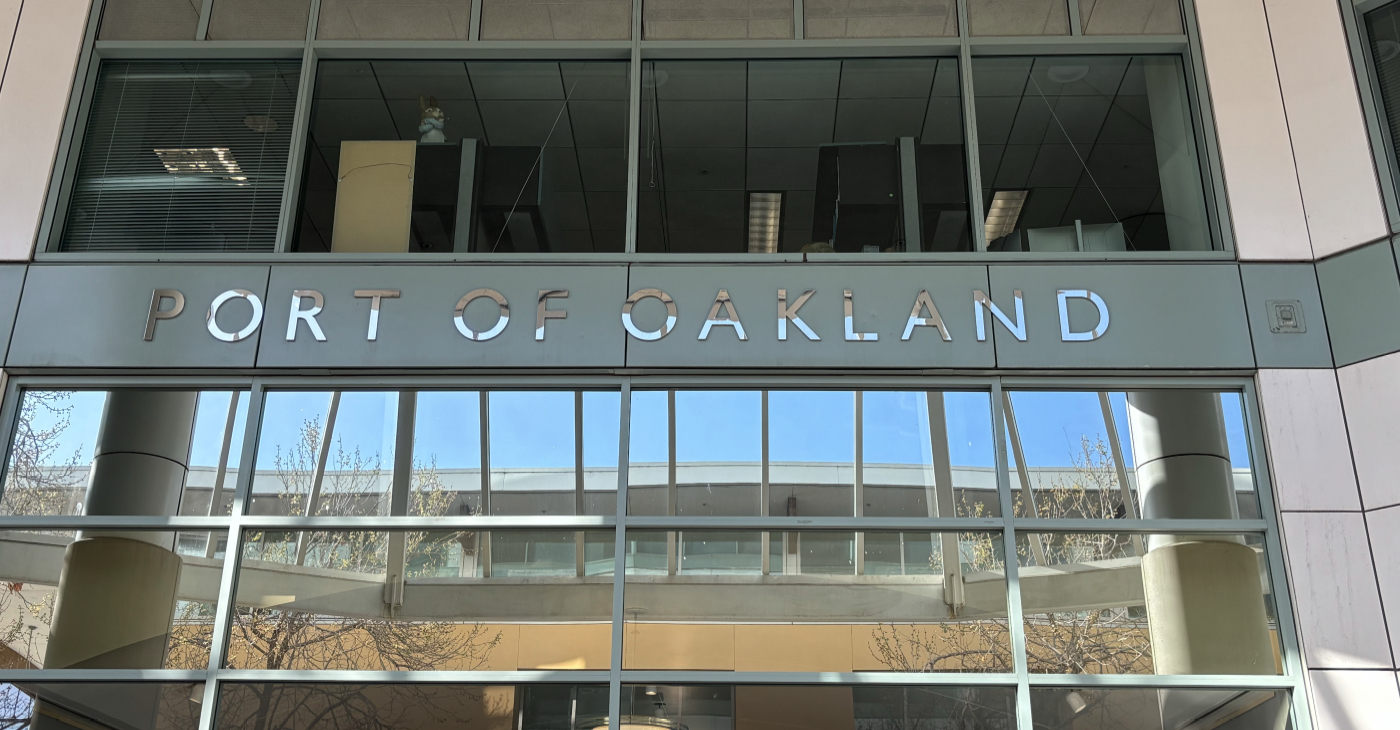
By Magaly Muñoz
The Port of Oakland Commission voted unanimously to change the name of Metropolitan Oakland International Airport to San Francisco Bay Oakland International Airport at a commission meeting Thursday afternoon.
The Port initially announced the name change on March 29, claiming that the change will attract more passengers and enhance the airport’s visibility. They contend that the airport often gets neglected by the public’s lack of knowledge of Oakland’s proximity to San Francisco.
“We want people to know where Oakland is and how beautiful our city is. We want them to visit, we want them to spend their money, and we want to keep our money into our local economy,” Port Commission President Barbara Leslie said at the meeting.
The commissioners shared anecdotal experiences and research to explain how this new name change will elevate and add to the growth of Oakland, not take away from their Bay Area neighbors.
The Port claimed that local residents had been asking for more options in domestic and international flights, but in order to do that, outside travelers need to be aware of Oakland’s presence first.
Since the announcement of the new name, San Francisco leaders strongly opposed the suggestion for a change, the City Attorney going as far as threatening legal action.
SF City Attorney David Chiu announced Monday that his team sent a letter to the Port of Oakland, writing that if Oakland goes forward with the name change, the city will go forward with a lawsuit to prevent the use of their trademarked name.
San Francisco owns U.S. federal trademark registrations for the marks “San Francisco International Airport”, the letter says.
Chiu further claimed that the name change will only cause confusion and chaos for travelers who are used to seeing the San Francisco name in the SFO trademark.
“We want to see the entire Bay Area thrive as a tourist destination and expand our offerings to visitors, but this proposal is not a legal or practical way to go about it. If Oakland moves forward with this proposal, San Francisco will pursue legal action to prevent misuse of our trademark,” Chiu said.
SF Mayor London Breed joined Chiu’s letter, stating that Oakland does not need to add the internationally popular city to its brand in order to grow its services.
“[Oakland] is rich in culture and wonderful people and has its own unique identity. It does not need the name San Francisco as part of its airport to stand out,” Breed wrote.
The Port defended its proposed actions, saying that if the vote did go forward, they would “take all appropriate measures to defend its right to use this accurate geographic identifier.”
“The proposed name modification will clarify, not confuse. The new name identifies where OAK is actually located, which is on the San Francisco Bay,” a spokesperson said on behalf of the Port.
Support for the name change extends beyond the Port. Several regional leaders, airlines and community members have come out in support of the name change, including Oakland Mayor Sheng Thao.
“This adjustment isn’t just about signage—it’s about inviting travelers to discover all that Oakland and the region have to offer. From our local dining scene to unique shopping spots and cozy hotels, there’s something here for everyone. Let’s work together to ensure that Oakland Airport continues to serve as a welcoming gateway for visitors and a source of pride for our community,” Thao said.
Because of public outcry amongst residents and leaders in Oakland and San Francisco before and during the Commission meeting, the Board decided to extend the second reading for the proposed name change from the end of April to the first meeting in May. This decision will allow commissioners to connect with community groups and leaders over their concerns for the change.
The Port Commission is scheduled to hold a second reading of the proposed name change on May 9.
-

 Activism4 weeks ago
Activism4 weeks agoOakland Post: Week of March 20 – 26, 2024
-

 #NNPA BlackPress3 weeks ago
#NNPA BlackPress3 weeks agoCOMMENTARY: D.C. Crime Bill Fails to Address Root Causes of Violence and Incarceration
-

 #NNPA BlackPress4 weeks ago
#NNPA BlackPress4 weeks agoFrom Raids to Revelations: The Dark Turn in Sean ‘Diddy’ Combs’ Saga
-

 #NNPA BlackPress3 weeks ago
#NNPA BlackPress3 weeks agoMayor, City Council President React to May 31 Closing of Birmingham-Southern College
-

 #NNPA BlackPress4 weeks ago
#NNPA BlackPress4 weeks agoCOMMENTARY: Lady Day and The Lights!
-

 Activism3 weeks ago
Activism3 weeks agoOakland Post: Week of March 27 – April 2, 2024
-

 #NNPA BlackPress4 weeks ago
#NNPA BlackPress4 weeks agoBaltimore Key Bridge Catastrophe: A City’s Heartbreak and a Nation’s Alarm
-

 #NNPA BlackPress4 weeks ago
#NNPA BlackPress4 weeks agoBaltimore’s Key Bridge Struck by Ship, Collapses into Water

